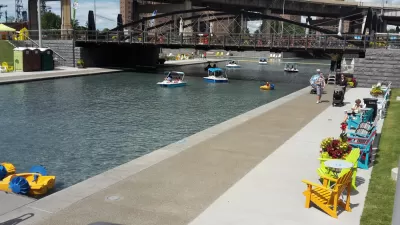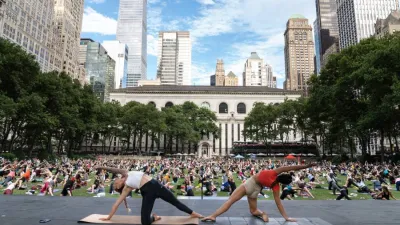Brookings has collected a year of data on an experiment it calls "transformative placemaking," with case studies from up and down the East Coast.

"By numerous measures, the Steel City is on the rise. But much of its growth and prosperity are concentrating downtown and in a handful of adjacent neighborhoods, while other neighborhoods—home primarily to people of color and high-poverty households—have yet to feel the lift," according to an article by Jennifer S. Vey and Hanna Love.
The example of Pittsburgh is cited as emblematic of similar dichotomies in other cities around the United States, and the raison d'être for a program established a year ago to address exactly these challenges. Vey and Love explain more:
One year ago this month, Brookings Metro dove into this fray with the establishment of the Bass Center for Transformative Placemaking. The impetus stemmed from the recognition that market disruptions, coupled with changing demographic and household structures, are sharpening the nation’s long-standing spatial divides—and that new sets of place-led policies and practices are essential to bridging them.
A year later, the team at the Bass Center is revealing an "outcome-oriented framework" for transformative placemaking.
The framework—meant to be adapted and refined to reflect community priorities and realities—is designed to provide stakeholders in urban, suburban, and rural areas with a holistic template for creating connected, vibrant, and inclusive communities.
According to the article, three attributes distinguish transformative placemaking from other forms of practice and public relations: scope, scale and level of integration. The article cites examples from Philadelphia, Memphis, and more to show examples of how this framework can be put into practice in different market and political environments.
FULL STORY: Transformative placemaking: A framework to create connected, vibrant, and inclusive communities

Maui's Vacation Rental Debate Turns Ugly
Verbal attacks, misinformation campaigns and fistfights plague a high-stakes debate to convert thousands of vacation rentals into long-term housing.

Planetizen Federal Action Tracker
A weekly monitor of how Trump’s orders and actions are impacting planners and planning in America.

In Urban Planning, AI Prompting Could be the New Design Thinking
Creativity has long been key to great urban design. What if we see AI as our new creative partner?

Pedestrian Deaths Drop, Remain Twice as High as in 2009
Fatalities declined by 4 percent in 2024, but the U.S. is still nowhere close to ‘Vision Zero.’

King County Supportive Housing Program Offers Hope for Unhoused Residents
The county is taking a ‘Housing First’ approach that prioritizes getting people into housing, then offering wraparound supportive services.

Researchers Use AI to Get Clearer Picture of US Housing
Analysts are using artificial intelligence to supercharge their research by allowing them to comb through data faster. Though these AI tools can be error prone, they save time and housing researchers are optimistic about the future.
Urban Design for Planners 1: Software Tools
This six-course series explores essential urban design concepts using open source software and equips planners with the tools they need to participate fully in the urban design process.
Planning for Universal Design
Learn the tools for implementing Universal Design in planning regulations.
planning NEXT
Appalachian Highlands Housing Partners
Mpact (founded as Rail~Volution)
City of Camden Redevelopment Agency
City of Astoria
City of Portland
City of Laramie





























